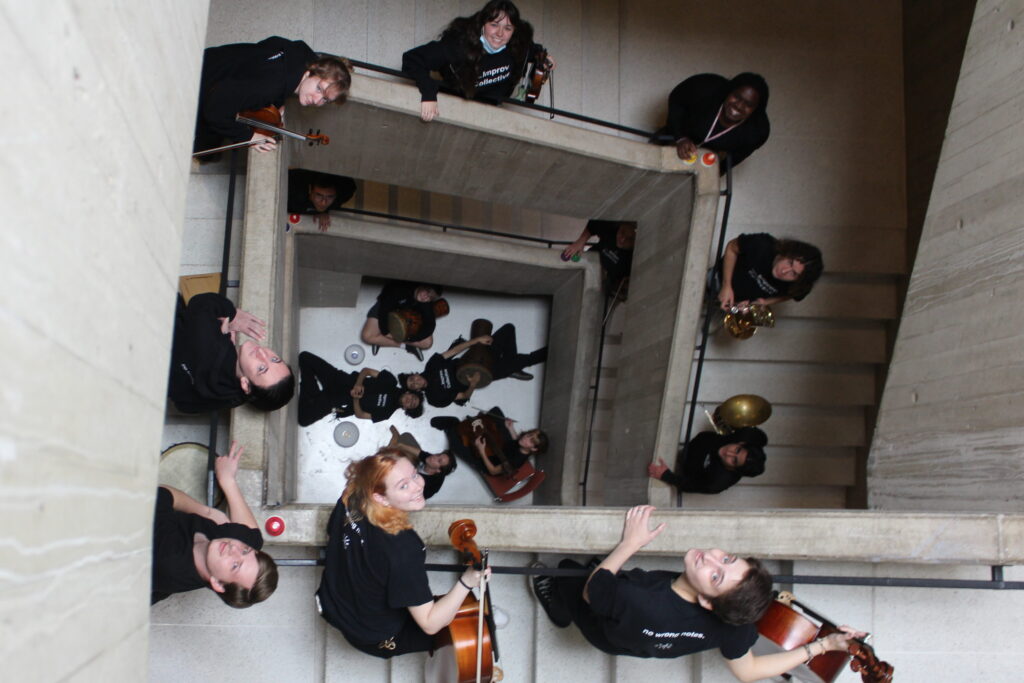LUKE VILLAVICENCIO
Asst. Life & Arts Editor
Have you ever, in a bout of boredom, started tapping a beat on your desk or humming a tune to yourself?

The tune or rhythm wasn’t from anything in particular, just the ramblings of your inner mind, waiting for something or someone in order to continue your day.
You likely weren’t taking care to notice the key in which you were humming or what meter you were drumming, and yet sounds resembling organized music took form. The music then proceeded to fade to the wind as quickly as it came, on to the next empty mind looking for a song to pass the time.
What you were doing at that moment was improvisation: composing music on the spot to convey the current nature of your wandering mind.
This is the main focus of Fredonia’s own Improv Collective.
As a composer, I had always been curious about improvisation, since I’m most often doing what is essentially the opposite of improv: revising. So, I took my curiosity and brought it to the first meeting of the Improv Collective on Sunday, Feb. 4.
The rehearsal space in Mason Hall began to fill with a neat sum of about 15 music students, all with their instruments at the ready.
The president of the club, Molly Gibson, a junior music education major, stood and began her spiel for all of the new members, then proceeded to get the performance underway.
As we began, my thoughts wandered to the idea that this interesting collection of performers who normally pursue a classical discipline are now taking a break from written music to create sounds and harmony that may never grace a page.
The first exercise that we did actually demonstrated perfectly how these different performance styles differ. One person would begin playing a short melody and repeating it, the next person then added their own repeated phrase to the mix and so on.
This continued until everyone was playing and the space became filled with beautifully sonorous cause-and-effect in real time. When you go from classical performance to improvisational performance, you’re essentially switching from relying on your sight to relying on your hearing and musical intuition.
“Improv is a pretty unique environment,” said Gibson. “There is no other musical class or classical instruction that brings to life creativity in such a safe space and an amazingly open community.”
I can speak to this from first-hand experience now after hearing some gorgeous improvisations from the club members that, due to the nature of the art, will never be heard again, which most definitely adds to its value and beauty.
The Venezuelan pianist and improviser Gabriela Montero has spoken on the value of improv: “Even in my daily life, if I had a fight with my brother, or if I was annoyed with my dad, I would sit down at the piano and improvise.”
Now, a classical musician may look at this and think about how this may take away from their education and constant practice of notated material.
Why would you stop rehearsing solos and studies for what may seem like simply letting your brain wander?
Gibson answers, “I’ve personally seen the effects that improvisation can have on classically trained musicians. It can change the way that we think about phrase structure, and melodic and harmonic structure, since of course none of this is preset, or on paper, you have to think about it to make it up.”
You can imagine how the honing of these skills can aid not only performers, but composers as well.
Just think about the many jazz musicians who practiced heavily on improvisation: Duke Ellington, Thad Jones, and Billy Strayhorn, to name a few.
Playing in the moment and really expressing emotions through improvisation can infuse real feeling into the melodies that you write.
Your spontaneous creations may just fade away, never to be heard again, or you may feel they have a larger purpose; they can transcend the moment to become a symphony.
However, I must say that as the meeting came to an end, I was left wanting more.
I felt such a pure sense of freedom and joy that helped me gain a bit more of a connection with my instrument, since, for those short two hours, we were not restrained by our practice routine as me and my instrument usually are.
So, if you’re a music student, or anyone who plays an instrument, and are looking for an outlet to release all of your college stress and anxiety, stop by Mason Hall on Sundays at 1 p.m. and spend the afternoon with fellow musicians, free of obligation and expectation.
As Gibson said, “You will not find another group of music-makers of this talent, spirit and comedy anywhere. [The improv collective is] truly unique in the best ways it can be.”
